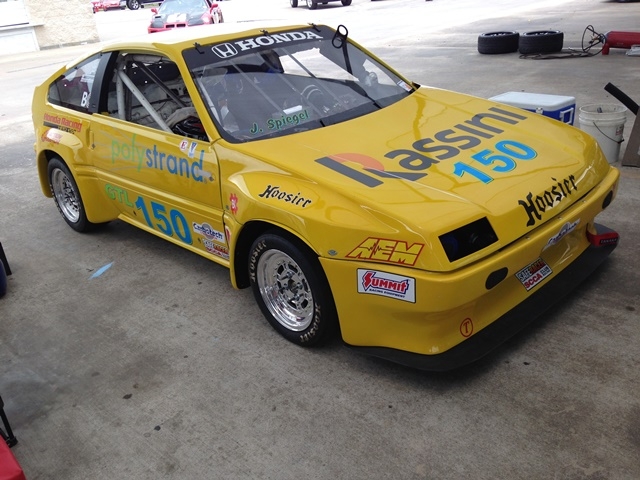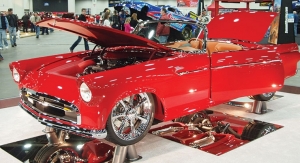07.08.16
PPG has announced that Polystrand Inc., a Denver-based manufacturer of thermoplastic composite materials, used TUFROV 4510 and TUFROV 4588 fiber glass roving products by PPG to build a racecar featuring the world’s first thermoplastic composite rear suspension.
The Grand Touring Lite (GT-Lite) racecar was designed by Jonathan Spiegel, senior engineer, Polystrand, who drove the car in a Sports Car Club of America (SCCA) event in Houston. He said the vehicle was built to demonstrate that continuous-fiber-reinforced thermoplastic resin is an excellent material for automotive suspension and structural components.
“There are light-truck and passenger-car suspensions equipped with composite springs, but they have always been made with thermoset resins,” Spiegel explained. “We believe our car is the first in the world to employ a thermoplastic resin, which offers distinct advantages over thermoset resin, such as faster production cycle times, higher impact resistance, easier recyclability and no VOC (volatile organic compound) emissions during processing.”
Spiegel said he specified TUFROV 4510 continuous-strand fiber glass roving as reinforcement for suspension components because its excellent tensile strength, flexural modulus and sizing compatibility provide superior mechanical properties and fatigue performance compared to other fiber glass products on the market.
TUFROV 4588 long-fiber thermoplastic (LFT) reinforcement roving was laminated into hybrid interior sandwich panels, which made the car lighter and safer to drive, and it was used to reinforce the front air splitter, which acts as an aerodynamic aid under the nose of the car.
Camilo Serrano, PPG global business manager, direct draw fiber glass products, said the collaboration with Polystrand highlights PPG’s commitment to partnering with customers. “Aiding customers in the development of groundbreaking technologies allows PPG to add value to their products and strengthen relationships,” he said. “We’re dedicated to innovation, both internally and as a strategy for helping customers create new markets for their products.”
Polystrand chose a GT-Lite racecar as its innovation platform because SCCA rules give engineers the freedom to try new materials and ideas in their vehicle designs. In the Houston SCCA race, the Polystrand car was in second place when an electrical failure forced it to withdraw.

The Grand Touring Lite (GT-Lite) racecar was designed by Jonathan Spiegel, senior engineer, Polystrand, who drove the car in a Sports Car Club of America (SCCA) event in Houston. He said the vehicle was built to demonstrate that continuous-fiber-reinforced thermoplastic resin is an excellent material for automotive suspension and structural components.
“There are light-truck and passenger-car suspensions equipped with composite springs, but they have always been made with thermoset resins,” Spiegel explained. “We believe our car is the first in the world to employ a thermoplastic resin, which offers distinct advantages over thermoset resin, such as faster production cycle times, higher impact resistance, easier recyclability and no VOC (volatile organic compound) emissions during processing.”
Spiegel said he specified TUFROV 4510 continuous-strand fiber glass roving as reinforcement for suspension components because its excellent tensile strength, flexural modulus and sizing compatibility provide superior mechanical properties and fatigue performance compared to other fiber glass products on the market.
TUFROV 4588 long-fiber thermoplastic (LFT) reinforcement roving was laminated into hybrid interior sandwich panels, which made the car lighter and safer to drive, and it was used to reinforce the front air splitter, which acts as an aerodynamic aid under the nose of the car.
Camilo Serrano, PPG global business manager, direct draw fiber glass products, said the collaboration with Polystrand highlights PPG’s commitment to partnering with customers. “Aiding customers in the development of groundbreaking technologies allows PPG to add value to their products and strengthen relationships,” he said. “We’re dedicated to innovation, both internally and as a strategy for helping customers create new markets for their products.”
Polystrand chose a GT-Lite racecar as its innovation platform because SCCA rules give engineers the freedom to try new materials and ideas in their vehicle designs. In the Houston SCCA race, the Polystrand car was in second place when an electrical failure forced it to withdraw.





